A Global Discussion about Public Engagement and Its Impact on Parliaments
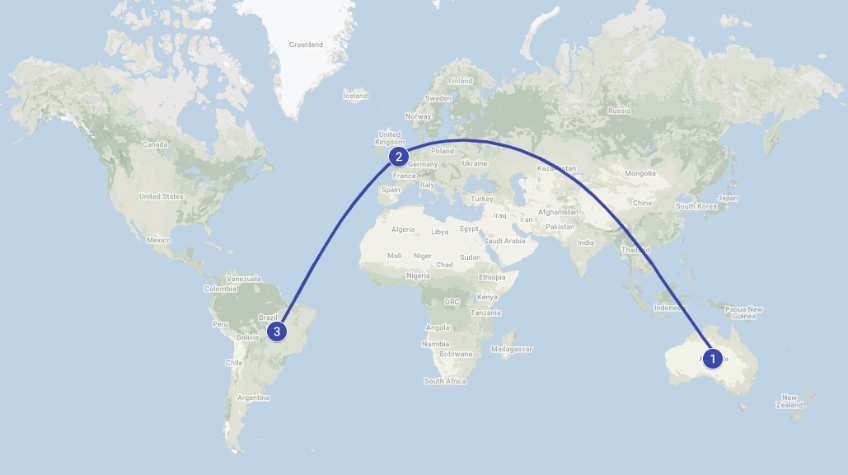
This blogpost presents an overview, with links to further resources, of the first conference held by IPEN - International Parliament Engagement Network. This was a highly innovative and energising conference, bringing together over two hundred participants from across the globe. Read on, to find out more.
IPEN (International Parliament Engagement Network) was created in 2020 to bring together academics, parliamentary officials and third sector representatives from all over the world, who work on public engagement and parliament. We currently have 219 members from over 30 countries. IPEN aims to share good practice, identify key challenges and ways to address these, promote the exchange of information between practitioners and academics and support enhancement of practices. We have a digital platform where we meet for text based discussions and monthly seminars. Last March, we had our first (global) one day conference.
Our long-awaited Public Engagement and its Impact on Parliaments conference took place Friday 26th March 2021. We wanted the conference to reflect our geographically diverse set of members by splitting the day between three hubs: in Australia, Europe and Brazil. In total 209 participants joined in from 41 different countries in every continent bar Antarctica! We were pleased to have a fantastic mix of academics, parliamentary officials, and members of third sector organisations, bringing very diverse perspectives to the discussions.
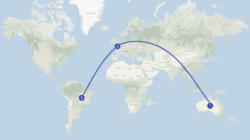
The three hubs of IPEN's conference
Sarah Moulds (University of South Australia and IPEN Executive team member) kicked off the conference in Australia with input from experts around the region. The hub began with an exploration of the ‘big picture’ topics, including the question of why public engagement is important to modern parliamentary democracies, who should be responsible for doing the engagement work and how the needs of different ‘publics’ might be met. The hub also explored the different commitments and responsibilities of parliamentary staff when it comes to engaging with the public, and how to evaluate the impact of public engagement activities.
Officials from a range of Australian jurisdictions, including the Australian Senate and the Parliament of New South Wales, gave insights to the challenges faced by parliamentarians when developing engagement strategies and navigating relationships. The Australian hub ended with discussions about ‘outside the box thinking’ to help engage those ‘publics’ previously underrepresented or ignored in public engagement strategies, such as young people and First Nations people in Australia.
We continued with the Europe hub, introduced by Cristina Leston-Bandeira (University of Leeds) and Elise Uberoi (UK House of Commons), the co-founders of IPEN. The Europe hub was supported by live scribing from Laura Evans of Nifty Fox Creative. Laura produced visual summaries of each of the hub’s three sessions, which worked very well to communicate the discussions of these sessions in an effective manner. She also helped facilitate our interactive workshop about a Public Engagement Toolkit (see below).
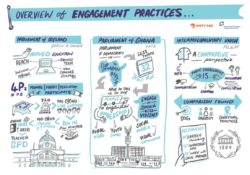
IPEN conference session on overview of public engagement practices
The first session, chaired by Aileen Walker (Global Partners and Governance), aimed to showcase different public engagement practices around the world. Conor Reale and Derek Dignam (Parliament of Ireland) outlined how education programmes have been developed in this parliament, followed by Kate Addo (Parliament of Ghana) who presented the wide range of engagement approaches employed in this parliament. This session ended with an overview by Alex Prior of the forthcoming Inter-Parliamentary Union (IPU) report on public engagement. You can get a sense of the discussions, and further references through our Chat.
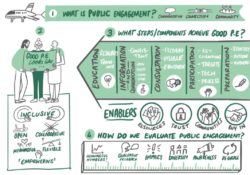
Collaborative work on a Public Engagement Toolkit
Session 2 aimed to utilise the richness of perspectives represented within IPEN to think through what a toolkit on public engagement would include. In the spirit of “practising what we preach” in terms of innovative engagement methods, we had a truly engaging and interactive workshop session. 61 participants worked together live and online across 13 different groups to discuss what public engagement entails, what good public engagement looks like, what its enablers are and how we should evaluate it; all with a view of collectively developing a toolkit of public engagement. Again, you can read some of the chat for a feel of the session here.
The visual summary of the session below summarises the range of ideas captured by the groups, all of which have been incorporated into a Public Engagement Toolkit, which reflects our collaborative work at the workshop, and which can be used and adapted by parliaments as they wish. The Public Engagement Toolkit can be accessed here, through a pdf and/or an interactive format. The link also includes a video from Laura Evans (Nifty Fox) explaining how we structured our collaborative work in the workshop.
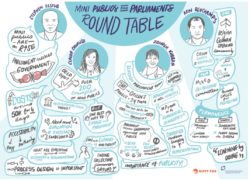
IPEN conference roundtable on mini-publics and parliaments
The final session of the Europe hub was a roundtable discussion about how parliaments have been using mini-publics and deliberative decision-making, chaired by Stephen Elstub (University of Newcastle). We heard about cases in Belgium from Min Reauchamps (Catholic University of Louvain), Scotland from Zohreh Khoban (Uppsala University), and around the world through the Organisation for Economic Co-operation and Development (OECD) from Claudia Chwalisz. The discussion considered different models of using mini-publics, their advantages and disadvantages. Further information and links to other resources can be found in the chat.
Finally, the Brazil hub closed the conference by focussing on digital forms of public engagement and left more than a few participants “flabbergasted” over Brazilian MPs’ use of social media!
Cristiane Brum Bernardes (CEFOR - Brazilian Chamber of Deputies) chaired Session 1: parliamentarians and social media where we heard from Marina Gattas (MP Chief Communication Adviser – Brazilian Chamber of Deputies) and Cristiano Ferri (CEFOR / Brazilian Chamber of Deputies) explaining the innovative and highly complex ways in which MPs in Brazil use social media to connect with their citizens.
In Session 2, chaired by Isabele Mitozo (Federal University of Maranhão), we heard from Viktor Chagas (Federal Fluminense University) who gave us an insight into the world of WhatsApp and how this has been used by campaign groups to influence institutional digital platforms of engagement, and Diego Cunha (LabHacker – Brazilian Chamber of Deputies) who spoke of challenges and opportunities offered by digital tools for civic engagement. The chat for both of these Brazil hub sessions can be found here.
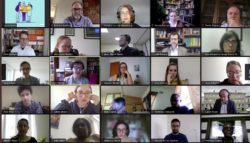
Participants at IPEN conference
It certainly was a long day, spanning 18.5 hours in total, and we appreciate everyone who attended any part(s) of the conference or the whole thing (special mention to our amazing IPEN Exec. team members Naomi Paxton and Alex Prior, who attended it all!). A thoroughly enjoyable conference superbly organised almost singlehandedly by Nicole Nisbett!
If you’re not part of IPEN yet and would like to join us, and keep up to date with our seminar series, please contact ParliamentEngagementNetwork@leeds.ac.uk. You can also/instead subscribe to our newsletter.
Recap of relevant links with further information:
- Conference’s website, with full details of programme: http://parliament-engagement.com/
- Recordings of sessions:
- Australia hub
- Europe hub, Session 1 (Overview of engagement practices)
- Europe hub, Session 3 (Mini-publics and parliaments)
- Brazil hub, Session 1 (Parliamentarians’ use of social media)
- Brazil hub, Session 2 (Institutional digital engagement)
- Chat discussions, including web links and resources cited:
- Public Engagement Toolkit developed collaboratively by 61 participants from across the globe, in session 2 of the Europe hub.
- Further details about IPEN: https://cdp.leeds.ac.uk/other-activity/international-parliament-engagement-network/
